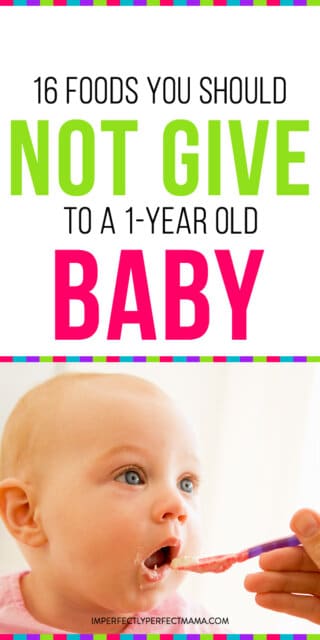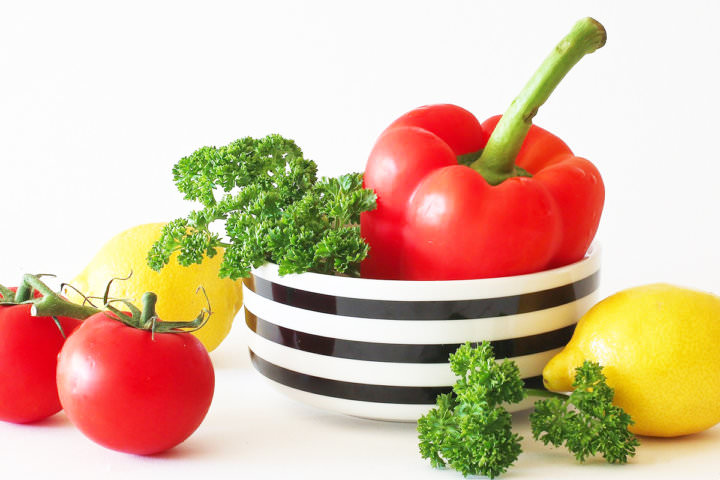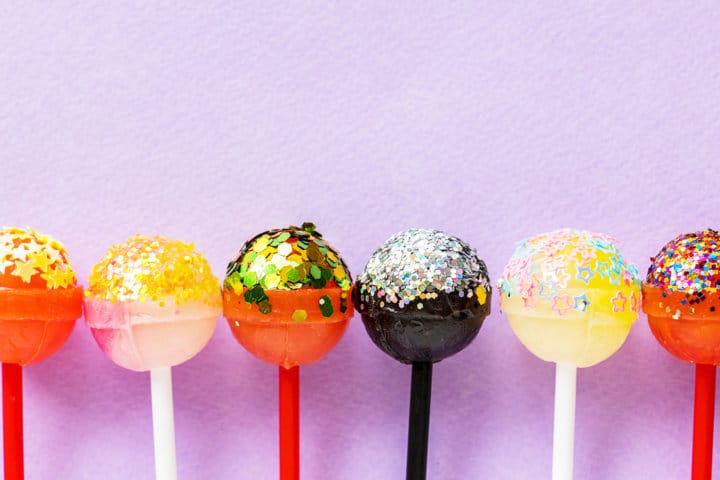Even though starting on solids can be a significant milestone in the first year of your baby’s life, it can also cause quite a bit of anxiety for the parents.

It’s challenging to know what your baby can and can’t have.
It goes without saying that your baby will be interested and attracted to everything that you put in your mouth and, sometimes, it is difficult to say “no” to the puppy eyes that will flicker in your direction.
You need to consider what goes into their mouths.
Six months old is the recommended age to start weaning your baby if he or she is showing signs.
You can then let them go ahead and explore the different tastes and textures.
However, there is a list of food that your little should avoid until after your baby turns one.
Pediatricians and health experts agree – mostly.
The foods that are included in this list are:
1. Honey
Honey is delicious and sweet to us but it has a potential source of Clostridium Botulinum Spores – which can be potent to your baby’s intestines and develop infant botulism.
A toddler with a more mature digestive system will be able to fight off the type of botulism honey can potentially give. Any baby younger than one year of age could be in serious danger.
The symptoms of Botulism are floppy movements, constipation, weak cries, and difficulty sucking from bottle or breast.
You should also stay clear of the dark and light corn syrups and other natural liquid sweeteners – such as maple syrup and agave nectar – as they pose the same threat.
If you’re looking for a sweetening alternative, you can always try pureed fruit instead. Just watch out for the sneaky sources of honey which could be present in cereals and graham crackers. Although, any honey in these foods may be processed instead of pasteurized.
2. Milk
During the first year of your baby’s life, you should stick to breast milk or formula.
When you give your baby milk straight from the carton, whether it be cow’s milk or soy milk, it could upset your little one’s belly and damage their kidneys. Babies are too young to digest the minerals in milk.
Some babies just aren’t able to handle the lactose in milk or any other dairy product. Some are allergic to the protein, which can cause some side effects such as diarrhea and other allergy symptoms.
If you still give your baby cow’s milk, there is a slight chance that your baby’s intestines could bleed and it also puts them at further risk of iron deficiency anemia.
You should give your little one a sippy cup of water if you find yourself unable to nurse or give a bottle of formula.
3. Peanut Butter
Peanut butter has been known to cause some severe allergic reactions because of the presence of nuts. Also, the thick, sticky substance is actually also a choking hazard and it isn’t easily dislodged!
If you have other older children, keep a close eye on them if you give them peanut butter and jelly sandwiches. Just because your baby is young, they are still fast!
When you decide to give your toddler peanut butter, ensure that you only do a thin layer in a sandwich or on a cracker. Alternatively, you can even cut the consistency by stirring in some applesauce.
4. Certain Vegetables

Who would of thought that some vegetables were on the naughty list to give to your baby?
Certain vegetables contain high levels of nitrates that your baby struggles to process, such as: lettuce, collard greens, beets, fennel, and spinach.
Your baby, under the age of one, won’t have a stomach strong enough to break down these nitrates. This ultimately blocks off the blood’s ability to transport oxygen.
A case of low-level oxygen is known as Blue Baby Syndrome and can be fatal. Even though you probably wasn’t thinking of serving your baby up with a 5-star salad dish, you should skip any sautéed leafy greens too.
Stick to sweet potatoes, cooked squashes, peas, and any other (soft) high-vitamin, low-nitrate veggies.
5. Certain Types of Fish
Your baby under one year old will be unable to consume fish such as swordfish, mackerel, shark, and tuna due to the high mercury levels.
Goldfish crackers are one of the most popular snacks to give to a child, which is fair enough – they’re fantastic! But if you want to try your baby on real fish, you’d be better off starting with white fish like cod, haddock, flounder, or sole.
Be sure to remove any bones before serving!
If you have a history of seafood allergy in your family, then you shouldn’t try any fish with your child under they are at least one or two years of age.
Even if your family doesn’t suffer from allergic reactions, don’t try your child on lobster or oysters until they are three because of the deadly allergic reactions they can induce.
6. Berries and Citrus
There are some proteins in individual berries that your baby and early toddlers will find hard to digest: strawberries, blackberries, blueberries and raspberries. Some citrus fruits like grapefruit and oranges are acidic so they can cause upset stomachs and rashes on the baby’s face, back, or in their private area.
Wait until after their first year before eating these foods to prevent any side effects. After a year, they are the perfect, healthy snacks for your child.
If you want to introduce these foods before your baby hits one, then offer a little bit at a time and make sure the berries are cut up in choke-free sizes. Remember to watch for a reaction.
7. Salt
Babies only need less than 1 gram of salt in their diet per day! That is a tiny amount, and if this is exceeded for a longer time than necessary, your baby’s kidneys won’t be able to cope with the vast amounts of sodium.
Remove a cooked portion of food that you’ve prepared for the family before you season the rest.
You should avoid any processed foods because ones that aren’t formulated for babies can contain too much sodium.
This will include a lot of boxed and dry flake cereals. Make sure to read the labels. These cereals can also be choking hazards.
8. Seeds and Nuts
Not only are nuts highly allergenic, but they are the most common foods for choking and potential death. They should be avoided entirely in the first year.
Your baby under the age of one has a tiny airway still, so something as small as a sunflower seed is a choking hazard and can become lodged in the throat.
You could always offer a cooked egg yolk or cubes of tofu if you’re looking for a protein boost.
9. Grapes
Grapes are a perfect snack for kids but only when they’re older. The skin is quite challenging to break down entirely and, because they are so firm, they are a severe choking hazard. Primarily due to the size of the fruit.
You might’ve heard of cutting them in half length ways, but this still poses a risk to your baby and young toddler. It’s the same as the smaller and drier version; the raisin.
If you want your baby to have fruit, try them with bananas or cooked down apples and pears.
10. Egg Whites
Severe allergic reactions are also linked to eggs, no matter how much your baby might seem to love them.
Choking on egg whites is extremely common. If you want to give your baby eggs, separate the whites from the yolk and cook it thoroughly. Alternatively, you can boil the eggs and peel the white away before serving.
You should introduce an egg alone just in case your baby does have an allergic reaction. You’ll then know exactly where it came from.
11. Chocolate
Of course, the same as most adults, babies would love to indulge in a good bit of chocolate.
Although, believe it or not, there is a high amount of caffeine in chocolate. It can also be difficult for babies under one to digest. If you have chocolate in the form of M&M’s, they can be a choking hazard.
12. Raw Carrots
Similar to grapes, the firmness of fresh carrots makes it in the ranking and is the 3rd most significant choking hazard for young children.
If you wish to serve your baby carrots, make sure they are cooked in water and then mashed.
Don’t give your baby any celery or raw apples either as you need to wait until your baby has enough back teeth to chew it well enough.
13. Hot Dogs
Hot dogs caused more choking injuries and deaths than any other food item in children up to the age of five – said a study in 2008.
You could even spend time cutting them into nickel-shapes discs but this does not prevent choking entirely. If you offer your elder children hot dogs, they should be cut lengthwise and then sliced.
Not only could they cause potential fatality but they contain nitrates just like other processed meats. This can cause low levels of oxygen in young children, especially if they have underdeveloped digestive systems that can’t break the nitrates down.
14. Popcorn
Even though popcorn is a crunchy, satisfying, and healthy snack, it is also a severe choking hazard for young children.
You’ll know that the outer parts of the popcorn can break off pretty quickly – the center of each piece is hard to dissolve and firm.
You should never give your child popcorn if they are under the age of one.
Most pediatricians recommend waiting under your child is at least the age of four before trying them on popcorn.
15. Hard Candy and Gum

You shouldn’t give your child hard candy like lollipops until they are old enough to brush their teeth.
It can make leaving a restaurant extra hard work, especially if you have older children that can enjoy the good things in life (hard candy).
My advice would be to keep a stash of your child’s favorite animal crackers in your purse and make sure your older children are discreet.
Gum is too advanced to give to a child under one year old. They do not possess the teeth or coordination required to chew it without swallowing it.
16. Wheat
Wheat is quite famous for allergies. If you know that there is a history of wheat allergy in your family, hold off from giving any to your child.
You might have even heard of gluten intolerance or “celiac disease,” which is an intolerance to wheat. It is recommended to wait until your baby is a year old at least to introduce any of these foods.
You can find some gluten-free options in supermarkets if you plan on laying off wheat for a while but they might contain other ingredients that you want to avoid (like salt).
You might find that brown pasta or rice might work and you can always try your baby out on this before you move onto the more harder whiter stuff.




3 Comments